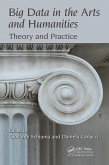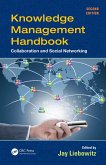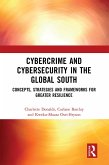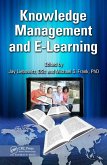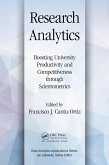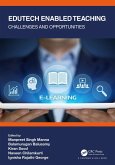Giovanni Schiuma, Daniela Carlucci
Big Data in the Arts and Humanities (eBook, PDF)
Theory and Practice
49,95 €
49,95 €
inkl. MwSt.
Sofort per Download lieferbar

25 °P sammeln
49,95 €
Als Download kaufen

49,95 €
inkl. MwSt.
Sofort per Download lieferbar

25 °P sammeln
Jetzt verschenken
Alle Infos zum eBook verschenken
49,95 €
inkl. MwSt.
Sofort per Download lieferbar
Alle Infos zum eBook verschenken

25 °P sammeln
Giovanni Schiuma, Daniela Carlucci
Big Data in the Arts and Humanities (eBook, PDF)
Theory and Practice
- Format: PDF
- Merkliste
- Auf die Merkliste
- Bewerten Bewerten
- Teilen
- Produkt teilen
- Produkterinnerung
- Produkterinnerung

Bitte loggen Sie sich zunächst in Ihr Kundenkonto ein oder registrieren Sie sich bei
bücher.de, um das eBook-Abo tolino select nutzen zu können.
Hier können Sie sich einloggen
Hier können Sie sich einloggen
Sie sind bereits eingeloggt. Klicken Sie auf 2. tolino select Abo, um fortzufahren.

Bitte loggen Sie sich zunächst in Ihr Kundenkonto ein oder registrieren Sie sich bei bücher.de, um das eBook-Abo tolino select nutzen zu können.
This books sheds light on the unique and creative contributions that the arts and humanities can make to the development of approaches to effectively use big data. It also looks at opportunities and challenges for research in the arts and humanities created by the capability to handle and use sophisticatedly very huge and complex data sets.
- Geräte: PC
- mit Kopierschutz
- eBook Hilfe
Andere Kunden interessierten sich auch für
![Big Data in the Arts and Humanities (eBook, ePUB) Big Data in the Arts and Humanities (eBook, ePUB)]() Giovanni SchiumaBig Data in the Arts and Humanities (eBook, ePUB)49,95 €
Giovanni SchiumaBig Data in the Arts and Humanities (eBook, ePUB)49,95 €![Knowledge Management Handbook (eBook, PDF) Knowledge Management Handbook (eBook, PDF)]() Knowledge Management Handbook (eBook, PDF)64,95 €
Knowledge Management Handbook (eBook, PDF)64,95 €![Cybercrime and Cybersecurity in the Global South (eBook, PDF) Cybercrime and Cybersecurity in the Global South (eBook, PDF)]() Charlette DonaldsCybercrime and Cybersecurity in the Global South (eBook, PDF)45,95 €
Charlette DonaldsCybercrime and Cybersecurity in the Global South (eBook, PDF)45,95 €![Knowledge Management and E-Learning (eBook, PDF) Knowledge Management and E-Learning (eBook, PDF)]() Knowledge Management and E-Learning (eBook, PDF)131,95 €
Knowledge Management and E-Learning (eBook, PDF)131,95 €![Culture Matters (eBook, PDF) Culture Matters (eBook, PDF)]() Norhayati ZakariaCulture Matters (eBook, PDF)34,95 €
Norhayati ZakariaCulture Matters (eBook, PDF)34,95 €![Research Analytics (eBook, PDF) Research Analytics (eBook, PDF)]() Research Analytics (eBook, PDF)45,95 €
Research Analytics (eBook, PDF)45,95 €![Edutech Enabled Teaching (eBook, PDF) Edutech Enabled Teaching (eBook, PDF)]() Edutech Enabled Teaching (eBook, PDF)45,95 €
Edutech Enabled Teaching (eBook, PDF)45,95 €-
-
-
This books sheds light on the unique and creative contributions that the arts and humanities can make to the development of approaches to effectively use big data. It also looks at opportunities and challenges for research in the arts and humanities created by the capability to handle and use sophisticatedly very huge and complex data sets.
Hinweis: Dieser Artikel kann nur an eine deutsche Lieferadresse ausgeliefert werden.
Dieser Download kann aus rechtlichen Gründen nur mit Rechnungsadresse in A, B, BG, CY, CZ, D, DK, EW, E, FIN, F, GR, HR, H, IRL, I, LT, L, LR, M, NL, PL, P, R, S, SLO, SK ausgeliefert werden.
Hinweis: Dieser Artikel kann nur an eine deutsche Lieferadresse ausgeliefert werden.
Produktdetails
- Produktdetails
- Verlag: Taylor & Francis eBooks
- Seitenzahl: 246
- Erscheinungstermin: 27. April 2018
- Englisch
- ISBN-13: 9781351172592
- Artikelnr.: 56834873
- Verlag: Taylor & Francis eBooks
- Seitenzahl: 246
- Erscheinungstermin: 27. April 2018
- Englisch
- ISBN-13: 9781351172592
- Artikelnr.: 56834873
- Herstellerkennzeichnung Die Herstellerinformationen sind derzeit nicht verfügbar.
Giovanni Schiuma is professor of innovation management at the University of Basilicata (Italy) and visiting professor of Arts Based Management at University of the Arts London. He is widely recognized as one of the world's leading experts in arts and business and has authored or coauthored more than 200 publications on a range of research topics particularly embracing strategic knowledge asset and intellectual capital management, strategic performance measurement and management, innovation systems, innovation management, and organizational development. He is an inspiring speaker and facilitator, with extensive research management expertise and excellent ability to coordinate complex projects and lead research teams. Giovanni holds a number of visiting professorships and research fellowship appointments with renowned international universities, and as a visiting lecturer, he regularly gives seminars, workshops, and master classes around the world.
Daniela Carlucci is an assistant professor at the University of Basilicata, Italy. She teaches business management, project management, and project evaluation and management. Her research interests focus mainly on knowledge assets management, performance measurement and management, decision support methods, and organizational development. She has been a visiting scholar at the Cranfield School of Management, visiting professor at the Tampere University of Technology, and visiting researcher at the University of Arts of London. She is author and coauthor of several publications, including chapters of books, articles, and research reports on a range of research topics. Her researches have been published in internationally recognized journals such as Expert Systems with Applications, Production Planning and Control, Healthcare Management Science, Measuring Business Excellence, Knowledge Management Research and Practice, and many others. She systematically carries out referee activities for international scientific journals. She is actively involved in relevant research and consultancy activities as researcher and has worked on research projects involving national organizations and institutions. Moreover, Daniela is systematically engaged in teaching activities in public and private institutions.
Daniela Carlucci is an assistant professor at the University of Basilicata, Italy. She teaches business management, project management, and project evaluation and management. Her research interests focus mainly on knowledge assets management, performance measurement and management, decision support methods, and organizational development. She has been a visiting scholar at the Cranfield School of Management, visiting professor at the Tampere University of Technology, and visiting researcher at the University of Arts of London. She is author and coauthor of several publications, including chapters of books, articles, and research reports on a range of research topics. Her researches have been published in internationally recognized journals such as Expert Systems with Applications, Production Planning and Control, Healthcare Management Science, Measuring Business Excellence, Knowledge Management Research and Practice, and many others. She systematically carries out referee activities for international scientific journals. She is actively involved in relevant research and consultancy activities as researcher and has worked on research projects involving national organizations and institutions. Moreover, Daniela is systematically engaged in teaching activities in public and private institutions.
I. Understanding Big Data in Arts and Humanities. 1. Literature Review on Big Data: What Do We Know So Far? 2. Toward a Data-Driven World: Challenges and Opportunities in Arts and Humanities. 3. "Never Mind the Quality, Feel the Width": Big Data for Quality and Performance Evaluation in the Arts and Cultural Sector and the Case of "Culture Metrics". 4. Toward "Big Data" in Museum Provenance. 5. From Big Data to Thick Data: Theory and Practice. Section II. Digital Humanities. 6. Big Data and the Coming Historical Revolution: From Black Boxes to Models. 7. Use of Big Data in Historical Research. 8. The Study of Networked Content: Five Considerations for Digital Research in the Humanities. 9. The English Gothic Novel: Theories and Praxis of Computer-Based Macroanalysis in Literary Studies. Section III. Managing Big Data with and for Arts and Humanities. 10. Toward a Data Culture in the Cultural and Creative Industries. 11. Arts Council England: Using Big Data to Understand the Quality of Arts and Cultural Work. 12. Visualization of Scientific Image Data as Art Data. 13. Museums, Archives, and Universities-Structuring Future Connections with Big Data. 14. Mobile Technology to Contribute Operatively to the Safeguard of Cultural Heritage. 15. Artists, Data, and Agency in Smart Cities.
I. Understanding Big Data in Arts and Humanities. 1. Literature Review on
Big Data: What Do We Know So Far? 2. Toward a Data-Driven World: Challenges
and Opportunities in Arts and Humanities. 3. "Never Mind the Quality, Feel
the Width": Big Data for Quality and Performance Evaluation in the Arts and
Cultural Sector and the Case of "Culture Metrics". 4. Toward "Big Data" in
Museum Provenance. 5. From Big Data to Thick Data: Theory and Practice.
Section II. Digital Humanities. 6. Big Data and the Coming Historical
Revolution: From Black Boxes to Models. 7. Use of Big Data in Historical
Research. 8. The Study of Networked Content: Five Considerations for
Digital Research in the Humanities. 9. The English Gothic Novel: Theories
and Praxis of Computer-Based Macroanalysis in Literary Studies. Section
III. Managing Big Data with and for Arts and Humanities. 10. Toward a Data
Culture in the Cultural and Creative Industries. 11. Arts Council England:
Using Big Data to Understand the Quality of Arts and Cultural Work. 12.
Visualization of Scienti¿c Image Data as Art Data. 13. Museums, Archives,
and Universities-Structuring Future Connections with Big Data. 14. Mobile
Technology to Contribute Operatively to the Safeguard of Cultural Heritage.
15. Artists, Data, and Agency in Smart Cities.
Big Data: What Do We Know So Far? 2. Toward a Data-Driven World: Challenges
and Opportunities in Arts and Humanities. 3. "Never Mind the Quality, Feel
the Width": Big Data for Quality and Performance Evaluation in the Arts and
Cultural Sector and the Case of "Culture Metrics". 4. Toward "Big Data" in
Museum Provenance. 5. From Big Data to Thick Data: Theory and Practice.
Section II. Digital Humanities. 6. Big Data and the Coming Historical
Revolution: From Black Boxes to Models. 7. Use of Big Data in Historical
Research. 8. The Study of Networked Content: Five Considerations for
Digital Research in the Humanities. 9. The English Gothic Novel: Theories
and Praxis of Computer-Based Macroanalysis in Literary Studies. Section
III. Managing Big Data with and for Arts and Humanities. 10. Toward a Data
Culture in the Cultural and Creative Industries. 11. Arts Council England:
Using Big Data to Understand the Quality of Arts and Cultural Work. 12.
Visualization of Scienti¿c Image Data as Art Data. 13. Museums, Archives,
and Universities-Structuring Future Connections with Big Data. 14. Mobile
Technology to Contribute Operatively to the Safeguard of Cultural Heritage.
15. Artists, Data, and Agency in Smart Cities.
I. Understanding Big Data in Arts and Humanities. 1. Literature Review on Big Data: What Do We Know So Far? 2. Toward a Data-Driven World: Challenges and Opportunities in Arts and Humanities. 3. "Never Mind the Quality, Feel the Width": Big Data for Quality and Performance Evaluation in the Arts and Cultural Sector and the Case of "Culture Metrics". 4. Toward "Big Data" in Museum Provenance. 5. From Big Data to Thick Data: Theory and Practice. Section II. Digital Humanities. 6. Big Data and the Coming Historical Revolution: From Black Boxes to Models. 7. Use of Big Data in Historical Research. 8. The Study of Networked Content: Five Considerations for Digital Research in the Humanities. 9. The English Gothic Novel: Theories and Praxis of Computer-Based Macroanalysis in Literary Studies. Section III. Managing Big Data with and for Arts and Humanities. 10. Toward a Data Culture in the Cultural and Creative Industries. 11. Arts Council England: Using Big Data to Understand the Quality of Arts and Cultural Work. 12. Visualization of Scientific Image Data as Art Data. 13. Museums, Archives, and Universities-Structuring Future Connections with Big Data. 14. Mobile Technology to Contribute Operatively to the Safeguard of Cultural Heritage. 15. Artists, Data, and Agency in Smart Cities.
I. Understanding Big Data in Arts and Humanities. 1. Literature Review on
Big Data: What Do We Know So Far? 2. Toward a Data-Driven World: Challenges
and Opportunities in Arts and Humanities. 3. "Never Mind the Quality, Feel
the Width": Big Data for Quality and Performance Evaluation in the Arts and
Cultural Sector and the Case of "Culture Metrics". 4. Toward "Big Data" in
Museum Provenance. 5. From Big Data to Thick Data: Theory and Practice.
Section II. Digital Humanities. 6. Big Data and the Coming Historical
Revolution: From Black Boxes to Models. 7. Use of Big Data in Historical
Research. 8. The Study of Networked Content: Five Considerations for
Digital Research in the Humanities. 9. The English Gothic Novel: Theories
and Praxis of Computer-Based Macroanalysis in Literary Studies. Section
III. Managing Big Data with and for Arts and Humanities. 10. Toward a Data
Culture in the Cultural and Creative Industries. 11. Arts Council England:
Using Big Data to Understand the Quality of Arts and Cultural Work. 12.
Visualization of Scienti¿c Image Data as Art Data. 13. Museums, Archives,
and Universities-Structuring Future Connections with Big Data. 14. Mobile
Technology to Contribute Operatively to the Safeguard of Cultural Heritage.
15. Artists, Data, and Agency in Smart Cities.
Big Data: What Do We Know So Far? 2. Toward a Data-Driven World: Challenges
and Opportunities in Arts and Humanities. 3. "Never Mind the Quality, Feel
the Width": Big Data for Quality and Performance Evaluation in the Arts and
Cultural Sector and the Case of "Culture Metrics". 4. Toward "Big Data" in
Museum Provenance. 5. From Big Data to Thick Data: Theory and Practice.
Section II. Digital Humanities. 6. Big Data and the Coming Historical
Revolution: From Black Boxes to Models. 7. Use of Big Data in Historical
Research. 8. The Study of Networked Content: Five Considerations for
Digital Research in the Humanities. 9. The English Gothic Novel: Theories
and Praxis of Computer-Based Macroanalysis in Literary Studies. Section
III. Managing Big Data with and for Arts and Humanities. 10. Toward a Data
Culture in the Cultural and Creative Industries. 11. Arts Council England:
Using Big Data to Understand the Quality of Arts and Cultural Work. 12.
Visualization of Scienti¿c Image Data as Art Data. 13. Museums, Archives,
and Universities-Structuring Future Connections with Big Data. 14. Mobile
Technology to Contribute Operatively to the Safeguard of Cultural Heritage.
15. Artists, Data, and Agency in Smart Cities.

